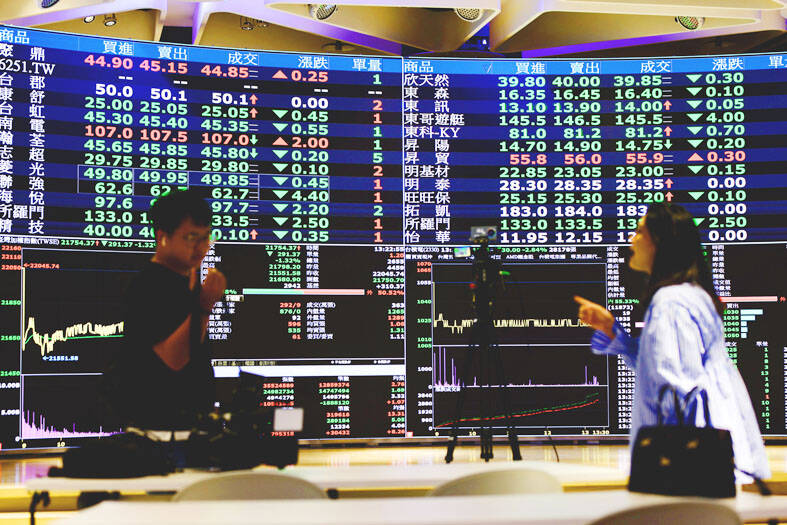The nation’s securities account balance, a gauge of retail investors’ confidence in local equities, rose to its highest level last month, as the TAIEX rallied 1,286.5 points — or 5.78 percent — in the month, data released on Friday by the central bank showed.
The securities account balance increased for a fourth consecutive month to NT$3.67 trillion (US$119.99 billion), up NT$263.5 billion from NT$3.41 trillion the previous month, the data showed.
The increase in the securities account balance came as the TAIEX continued to test the 23,000 level last month on the back of steady support from retail investors and foreign institutional investors, which bought a net NT$227.96 billion of local shares.

Photo: RITCHIE B. TONGO, EPA-EFE
In contrast, domestic investment trust firms sold a net NT$13.77 billion of local shares, Taiwan Stock Exchange (TWSE) data showed.
Last month, retail investors accounted for 51.3 percent of the main board’s trading volume, the highest since March and compared with 47 percent one month earlier, the data showed.
In comparison, local institutional investors made up 14.4 percent of total trading, down from 16.2 percent the previous month, while foreign institutional investors’ proportion of market transactions fell to 34.3 percent, from 36.8 percent.
The central bank’s latest data indicated that stock market sentiment remained bullish at the start of the third quarter of the year as the TAIEX averaged 22,963 points last month, up from 22,014 points in June and 21,271 points in May.
The balance of margin loans also increased to NT$315.2 billion last month, up from NT$305.4 billion in June and NT$297.7 billion in May, it said.
Meanwhile, the daily average turnover on the main board expanded to NT$319.9 billion, compared with NT$343 billion in June and NT$310.8 billion in May, it added.
The TAIEX last week fell 570.01 points, or 2.34 percent, to settle at 23,764.47 on Friday.
It has risen 3.17 percent so far this year, with a daily average turnover of NT$358.41 billion on the main board, TWSE data showed.
With the continued increase in the securities account balance, M1B money supply — a measure of money in circulation, including currency and passbook savings deposits — posted an annual growth rate of 2.86 percent last month, up from a 2.44 percent increase in June, the central bank said.
The annual growth rate in the broader measure M2 — which includes time deposits, time-saving deposits, foreign currency deposits, mutual funds and M1B — fell to 3.42 percent from 3.45 percent, as deferred income tax payments shifted the timing of tax receipts compared with the previous year, it said.
In the first seven months of the year, M1B increased 2.63 percent and M2 rose 4.16 percent from a year earlier, both remaining within the central bank’s target range of 2.5 to 6.5 percent annual growth, it said.
That indicates that market liquidity remains ample, which is beneficial to consumption, the stock market and the economy as a whole.

Taiwan Semiconductor Manufacturing Co (TSMC, 台積電), the world’s biggest contract chipmaker, booked its first-ever profit from its Arizona subsidiary in the first half of this year, four years after operations began, a company financial statement showed. Wholly owned by TSMC, the Arizona unit contributed NT$4.52 billion (US$150.1 million) in net profit, compared with a loss of NT$4.34 billion a year earlier, the statement showed. The company attributed the turnaround to strong market demand and high factory utilization. The Arizona unit counts Apple Inc, Nvidia Corp and Advanced Micro Devices Inc among its major customers. The firm’s first fab in Arizona began high-volume production

VOTE OF CONFIDENCE: The Japanese company is adding Intel to an investment portfolio that includes artificial intelligence linchpins Nvidia Corp and TSMC Softbank Group Corp agreed to buy US$2 billion of Intel Corp stock, a surprise deal to shore up a struggling US name while boosting its own chip ambitions. The Japanese company, which is adding Intel to an investment portfolio that includes artificial intelligence (AI) linchpins Nvidia Corp and Taiwan Semiconductor Manufacturing Co (TSMC, 台積電), is to pay US$23 a share — a small discount to Intel’s last close. Shares of the US chipmaker, which would issue new stock to Softbank, surged more than 5 percent in after-hours trading. Softbank’s stock fell as much as 5.4 percent on Tuesday in Tokyo, its

COLLABORATION: Softbank would supply manufacturing gear to the factory, and a joint venture would make AI data center equipment, Young Liu said Hon Hai Precision Industry Co (鴻海精密) would operate a US factory owned by Softbank Group Corp, setting up what is in the running to be the first manufacturing site in the Japanese company’s US$500 billion Stargate venture with OpenAI and Oracle Corp. Softbank is acquiring Hon Hai’s electric-vehicle plant in Ohio, but the Taiwanese company would continue to run the complex after turning it into an artificial intelligence (AI) server production plant, Hon Hai chairman Young Liu (劉揚偉) said yesterday. Softbank would supply manufacturing gear to the factory, and a joint venture between the two companies would make AI data

DOLLAR SIGNS: The central bank rejected claims that the NT dollar had appreciated 10 percentage points more than the yen or the won against the greenback The New Taiwan dollar yesterday fell for a sixth day to its weakest level in three months, driven by equity-related outflows and reactions to an economics official’s exchange rate remarks. The NT dollar slid NT$0.197, or 0.65 percent, to close at NT$30.505 per US dollar, central bank data showed. The local currency has depreciated 1.97 percent so far this month, ranking as the weakest performer among Asian currencies. Dealers attributed the retreat to foreign investors wiring capital gains and dividends abroad after taking profit in local shares. They also pointed to reports that Washington might consider taking equity stakes in chipmakers, including Taiwan Semiconductor